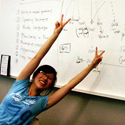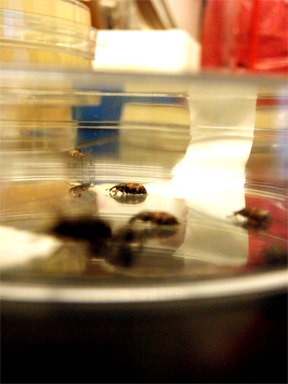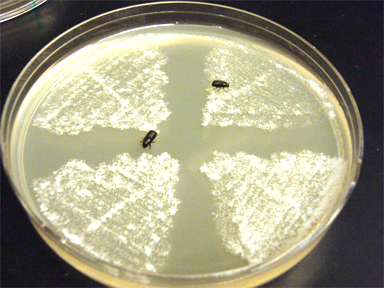Team:British Columbia/Notebook/Week 19
From 2011.igem.org
(→Dung beetles) |
|||
| (24 intermediate revisions not shown) | |||
| Line 9: | Line 9: | ||
==Mountain Pine Beetle and Saccharomyces cerevisiae Co-culturing== | ==Mountain Pine Beetle and Saccharomyces cerevisiae Co-culturing== | ||
| - | [[File:ubcigembeetleexp1.jpg]] | + | [[File:ubcigembeetleexp1.jpg | 300px ]] |
| + | <br/> | ||
| + | We ran the beetle transfer experiments not only with the mountain pine beetle, but also with the white pine weevil. Here we are getting the beetles from a generous benefactor | ||
| + | [[File:ubcigembeetleexp3.jpg | 300px ]] The White Pine Weevil | ||
| - | [[File: | + | [[File:ubcigembeetleexp5.jpg | 300px ]] |
| + | <br/> | ||
| + | Next came the fun part! We followed the beetle transfer protocol (see 'protocols'), transferring the beetle to the yeast plates, followed by placing them on a clean plate. After growing the plates (there was a lot of contamination), we analyzed the resultant yeast colonies to check for GFP and clonat resistance. | ||
| + | [[File:ubcigembeetleexp6.jpg | 300px ]] The deadly Mountain Pine Beetle! | ||
| - | [[File: | + | [[File:ubcigembeetleexp8.jpg | 300px ]] The MPB on a yeast plate. |
| + | [[File:ubcigembeetleexp7.jpg | 300px ]] | ||
| + | <br/>The beetles appeared to try to get the yeast off their backs by rolling around. | ||
| - | [[File: | + | [[File:ubcigembeetleexp2.jpg | 200px ]] |
| - | + | <br/>We noticed a brown spot on one of the beetles, and wanted to get a closer look. It turned out to be nothing, but then we heard we might see a mite! Alina searched long and hard for a mite, and found this beauty on one of the beetles. | |
| - | + | ||
| - | + | ||
| - | + | ||
| - | + | ||
| - | + | ||
| - | + | ||
| - | + | ||
| - | + | ||
| - | + | ||
<html><iframe width="425" height="349" src="http://www.youtube.com/embed/-fXdy8plAR8?hl=en&fs=1" frameborder="0" allowfullscreen></iframe></html> | <html><iframe width="425" height="349" src="http://www.youtube.com/embed/-fXdy8plAR8?hl=en&fs=1" frameborder="0" allowfullscreen></iframe></html> | ||
==Dung beetles== | ==Dung beetles== | ||
| - | [[File:ubcigembeetleexp4.jpg]] | + | [[File:ubcigembeetleexp4.jpg | 300px ]] |
| - | + | <br/>After playing with the beetles, we had beetle-shaped cupcakes. | |
| - | + | ||
| - | + | ||
| - | + | ||
| - | + | ||
| - | + | ||
| - | + | ||
<html> | <html> | ||
<a href="https://2011.igem.org/Team:British_Columbia/Notebook"><center><b>Back to the Notebook</b></center></a> | <a href="https://2011.igem.org/Team:British_Columbia/Notebook"><center><b>Back to the Notebook</b></center></a> | ||
Latest revision as of 02:40, 29 October 2011

 |
 |
 |
 |
 |
Mountain Pine Beetle and Saccharomyces cerevisiae Co-culturing
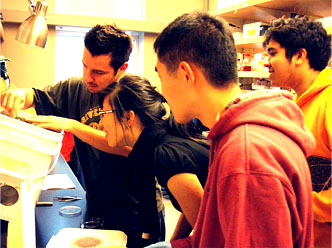
We ran the beetle transfer experiments not only with the mountain pine beetle, but also with the white pine weevil. Here we are getting the beetles from a generous benefactor
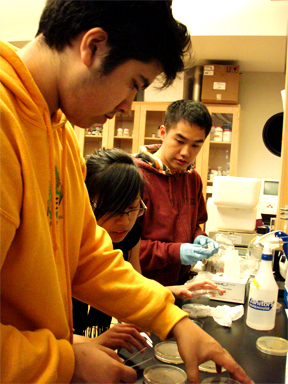
Next came the fun part! We followed the beetle transfer protocol (see 'protocols'), transferring the beetle to the yeast plates, followed by placing them on a clean plate. After growing the plates (there was a lot of contamination), we analyzed the resultant yeast colonies to check for GFP and clonat resistance.
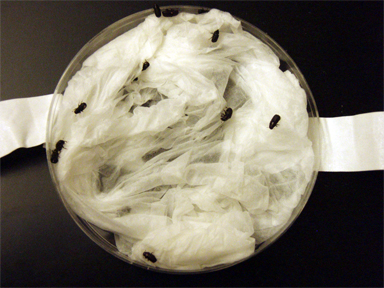 The deadly Mountain Pine Beetle!
The deadly Mountain Pine Beetle!
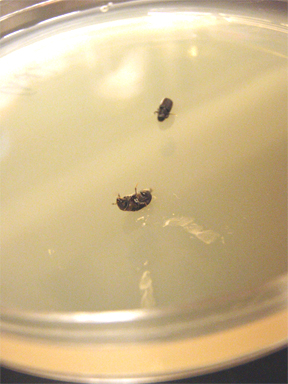
The beetles appeared to try to get the yeast off their backs by rolling around.
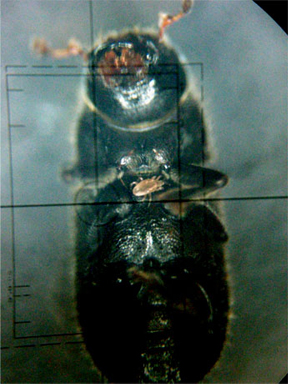
We noticed a brown spot on one of the beetles, and wanted to get a closer look. It turned out to be nothing, but then we heard we might see a mite! Alina searched long and hard for a mite, and found this beauty on one of the beetles.
Dung beetles
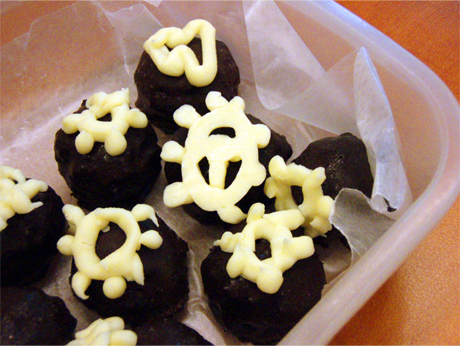
After playing with the beetles, we had beetle-shaped cupcakes.
 "
"








